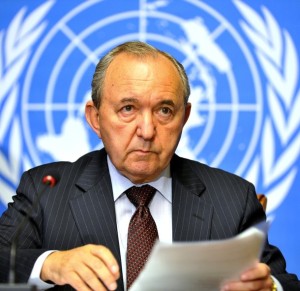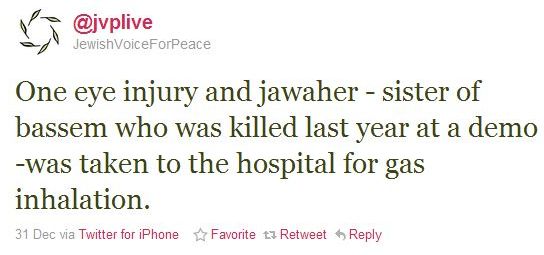Niv Raskin, IDF Radio: Now we turn to the IDF investigation on the death of protester Jawaher Abu Rahma. According to the IDF investigation, senior officers say it’s a kind of fabrication. The Bilin protester didn’t die of [tear] gas inhalation; she was a cancer patient. We want to talk about this issue with the family’s lawyer, Attorney Michael Sfard.
Attorney Michael Sfard: The IDF didn’t publish, its court journalists did.
Raskin: What do you mean?
Sfard: What I mean is that no IDF officer was willing to talk on-record. The IDF Spokesperson didn’t even put out a communiqué. Everything was done through journalists. They weren’t presented with even one document. I have never encountered such crazy fabricated blood libel.
Raskin: With your permission, let’s review the facts, at least as they were published. First, according to the reports, according to the investigation conducted by the IDF, there was no report of a wounded woman on Friday. According to those officers, at least, this casts doubt over whether she was at the protest at all.
Sfard: Niv, I don’t know where to start. There’s almost no word, no letter, of truth in the sentence you just uttered. And the most terrible thing is that I don’t know how Israeli media, which had the extraordinary courage to topple a Prime Minister [Olmert – DR] over corruption, acts like the North Korean media when it’s about something the IDF wants to achieve. There isn’t even one substantiating foundation for any of the components you described. Jawaher was at the protest. Dozens of people saw her there. I spoke to eyewitnesses who were beside her at the protest. Jawaher collapsed at the protest. She wasn’t sick like the IDF Spokesperson said on Friday. She didn’t have cancer as he’s saying today.
Raskin: Those officers ask why there aren’t photos of her at the protest when there dozens of photos from it.
Sfard: Because the IDF shot so much gas, that it was everywhere in the village and people all over were affected by it. The IDF has to this day refused order the opening of an [official] investigation. How is it supposed to obtain the photos? The Judge Advocate General hasn’t, until this very moment, ordered the opening of an investigation. So, on the one hand, they don’t open an investigation. On the other hand, they come up with these fabrications. If the IDF invested a tiny fraction of the energy it’s investing in fabrications, in investigating itself, lives would be saved because the IDF would know where its action were wrong.
Raskin: Let’s, with your permission, try to return to factual issues. The gaps in the timeline. According to the Palestinian medical reports, a blood sample was taken from Abu Rahme 40 minutes before she even arrived at the hospital. How does that work?
Sfard: Look at what we’re discussing. Do you know how many medical files I’ve seen where, under the pressure of a life threatening incident, someone wrote 2 instead of 3? That’s what’s important? According to what the IDF is telling journalists and journalists are telling us, is that she was a cancer patient. Is there one [real] journalist at Yediot this morning? Can the senior reporters — Nahum Barnea, Shimon Shiffer and Sever Plocker — ask the reporters and editors if they have one document substantiating the claim that she had leukemia? This is a farce! If we find an incorrect noting of a time, do we absolve the IDF of responsibility for her death?
Raskin: You’re criticizing the media?
Sfard: Of course.
Raskin: I’m not sure that’s the correct address. Someone gave them this version. Those were senior officers. Another allegation, they say, is that her clothes didn’t smell of tear gas, contradicting the Palestinian claims. They [also] talk about a quiet funeral, not the kind they have for Shahids [martyrs in Arabic — DR] and that the Palestinians usually know how to leverage [these funerals] for a PR advantage and that didn’t happen this time.
Sfard: Hold on, I want to understand, are you serious? The IDF is claiming that because it was a quiet funeral, she died from an illness and not by its hands? Is that a serious argument? So the IDF’s proof that she wasn’t at the protest is that there wasn’t rioting [at the funeral]? Look what’s become of us! I have to prove that there was or wasn’t a smell on Jawaher’s clothes when the IDF won’t investigate the incident? The IDF is talking about some kind of examination conducted by its officers. These aren’t people who know how to investigate.
Raskin: To summarize, bottom line, you’re saying that she wasn’t sick?
Sfard: What the hell? What sickness? She had an ear problem. We..really…her ear problem. Yesterday I got 20 calls from 20 reporters requesting an explanation what kind of problem she had with her ear. Let’s assume she had an ear problem. Does she deserve to die at a protest for it?
Raskin: A couple of days ago we spoke to her uncle who was with her at the protest. He said she was suffering from a kind of asthma and that she had suffered from respiratory problems over the past few years. That means that you can’t say she a clean medical record. Not that means anything. But it’s an important thing to say.
Sfard: Look, Niv. I’m not a Palestinian. I’m an Israeli and you’re an Israeli. I want to tell you..why not put out an orderly communiqué saying: ‘This is a tragic incident and we will investigate it. We use tear gas and other non-lethal weapons precisely so things like this won’t happen. We’ll look into how this happened.’ Then task the military police with a serious investigation, because a protester has died. This is important because, if an Israeli protester dies, it won’t matter what illness he had, the police will investigate seriously.
Raskin: Attorney Michael Sfard, representing the Abu Rahme family, thanks for joining us. I’ll just point out in this context that in contrast to what Attorney Sfard says, the item on the IDF investigation appears in all the [Israeli] media and not just in Yediot Aharonot, which Sfard attacked.


 Here’s a circle that should never have been closed.
Here’s a circle that should never have been closed.